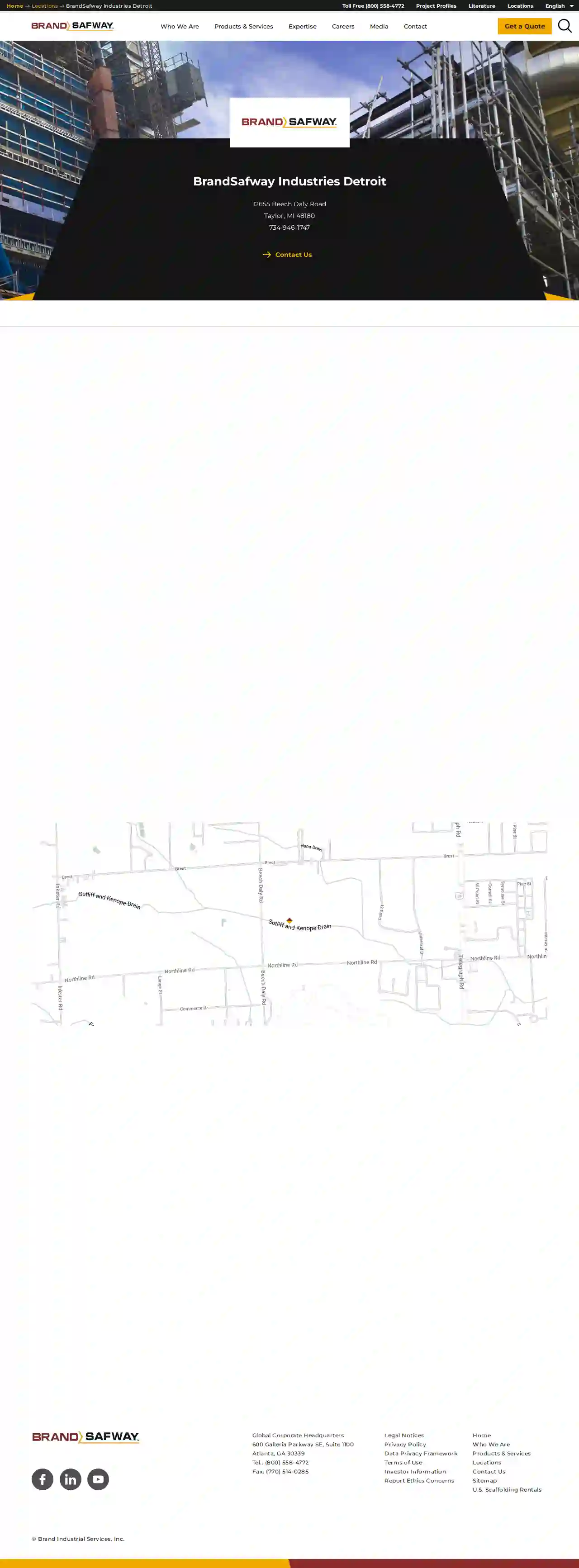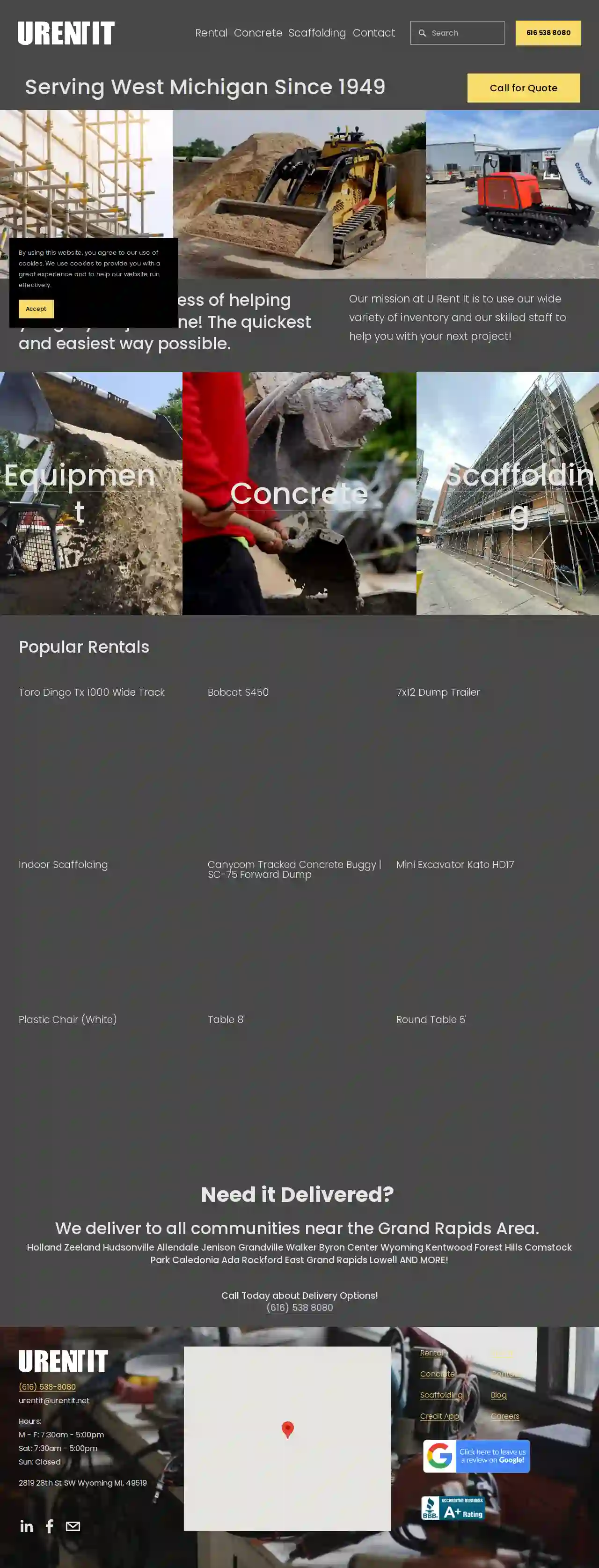Scaffolding Companies Milan
Find the best Construction Scaffolding in Milan
Receive multiple Scaffolding Solutions quotes for your project today! Compare profiles, reviews, accreditations, portfolio, etc... and choose the best service.

Swing-Lo Suspended Scaffold Co
46 reviewsP.O. Box 1287, 75609 CR 376, Covert, MI, 49043, USFaster, safer & more economical. Swing-Lo Suspended Scaffold is a one-stop destination for your suspended scaffolding. A company where safety is paramount, we pride ourselves on our over fifty-five-year history of supplying safe and durable suspended scaffolding worldwide. Our approach: The invention and introduction of Swing-Lo Suspended Scaffolds stemmed from the old adage, "necessity is the mother of invention". That was the motivation behind the invention of Swing-Lo Suspended Scaffolds by H. George Leonard, a painting contractor whose bid was below his competitors. The idea was derived from the old ice tong and a pair of scissors. The combination of both items provided him with a model that would scissor and grip the bottom flanges of I-beams on bridges. This model, along with a connecting hanger component produced a simple suspended scaffold that could be easily erected and dismantled. The application and performance of this scaffold was well received, and soon became a demand by bridge and painting contractors. Thus, the painter became the manufacturer of a particular type of scaffold whose market has expanded from local to national to international. Constant improvements in the design and fabrication of Swing-Lo Suspended Scaffolds have served to provide a safer, more efficient and economical scaffolding system for highway and utility contractors when access to work areas are a problem. Swing-Lo Suspended Scaffolds are patented with built-in, quick locking devices and fasteners for instant assembly. They have lessened the risks to the worker, lowered the cost, and increased safety in modern bridge and power plant construction and maintenance.
- Services
- Why Us?
- Accreditations
- Gallery
Get Quote
BrandSafway Industries Detroit
3.25 reviews123 Main St, Detroit, 48201, USBrandSafway is a leading provider of access and scaffolding solutions in Detroit, Michigan. With a strong commitment to safety and customer satisfaction, we offer a wide range of services to support various industries, including construction, energy, and manufacturing. Our team of experts is dedicated to delivering high-quality solutions that meet the unique needs of each project. From scaffolding and hoisting to shoring and forming, we have the expertise and equipment to ensure your project is completed safely and efficiently.
- Services
- Why Us?
- Accreditations
- Our Team
- Testimonials
Get Quote
National Ladder & Scaffold Co
4.539 reviews1234 Industrial Drive, Kentwood, 49512, USNational Ladder & Scaffold Co. is a leading provider of ladder and scaffolding solutions, offering a wide range of products and services to meet the needs of various industries. With a strong commitment to safety, quality, and customer satisfaction, the company strives to provide innovative solutions that enhance productivity and efficiency. Their team of experienced professionals ensures that clients receive top-notch service and support.
- Services
- Why Us?
- Accreditations
- Our Team
- Testimonials
Get Quote
Fraco USA, Inc.
51 reviews91, chemin des Patriotes, St-Mathias-sur-Richelieu, J3L 1T5, USFraco is a company committed to providing innovative and state-of-the-art vertical transportation equipment and solutions for the construction industry. With over 30 years of experience, we have been anticipating the access system needs of the construction industry. Our custom solutions ensure the safety and productivity of workers on construction sites around the world. We offer a range of products, including elevators, construction hoists, transport platforms, and permanent industrial elevators, as well as associated products and accessories.
- Services
- Why Us?
- Accreditations
- Gallery
Get Quote
U Rent It / Scaffolding Systems Inc.
4.981 reviews2819 28th St. SW, Wyoming, MI, 49519, USU Rent It is a leading equipment rental company in West Michigan, dedicated to providing a wide variety of inventory and skilled staff to help with your next project. With a mission to make your job easier and quicker, U Rent It offers equipment rentals including concrete, scaffolding, and popular items like indoor scaffolding, air compressors, and excavators. They also provide delivery options to all communities near the Grand Rapids Area. U Rent It is committed to customer satisfaction and offers a credit application for those interested.
- Services
- Why Us?
- Accreditations
- Our Team
- Testimonials
- Gallery
Get Quote
Scaffolding Systems Inc
2819 28th St. SW, Wyoming, MI, 49519, USU Rent It is a family-owned business that has been serving West Michigan since 1949. Our mission is to provide a wide variety of inventory and skilled staff to help you with your next project. We offer equipment rentals for concrete, scaffolding, and more, with delivery options available to all communities near the Grand Rapids Area.
- Services
- Why Us?
- Gallery
Get Quote- Ac
Ace Barnes Hardware Inc
4.6380 reviewsDetroit, US- Services
- Why Us?
Get Quote - Mi
Midtown Ace Hardware
4.5223 reviewsKalamazoo, US- Services
- Why Us?
Get Quote - De
De Loof Builders LLC
4.25 reviewsKalamazoo, US- Services
- Why Us?
Get Quote - Sc
Scaffolding Incorporated
4.527 reviewsDetroit, US- Services
- Why Us?
Get Quote
Over 2,353+ Scaffolding Contractors on our directory
Our scaffolding experts operate in Milan & beyond!
ScaffoldingHQ has curated and vetted Top Scaffolding Businesses arround Milan. Find a reliable pro today.
Frequently Asked Questions About Scaffolding Companies
- A temporary structure with a larger platform for workers and materials.
- Offers greater stability and working space.
- Suitable for tasks requiring movement and multiple workers.
- Used for higher elevations and more complex projects.
- Used for reaching specific points at height for short durations.
- Less stable than scaffolding, requiring more caution and balance.
- Not suitable for tasks involving heavy materials or extended work periods.
- Online Directories: Use specialized directories like ScaffoldingHQ to search for scaffolding companies in your area.
- Search Engines: Use Google or other search engines to search for 'scaffolding companies near me' or 'scaffolding rental [your location]'.
- Local Construction Associations: Contact local construction associations for recommendations.
- Word-of-Mouth Referrals: Ask friends, family, or colleagues for recommendations based on their past experiences.
- Licensing and Insurance: Verify their licenses are current and that they have adequate insurance coverage.
- Experience: Choose a company with a history of successfully completing similar projects. Ask for references and check their portfolio.
- Safety Record: Inquire about their safety practices and accident history. A strong safety culture is essential.
- Professionalism: Observe their communication, responsiveness, and attention to detail. A reputable company will be organized and transparent.
- Reviews and Testimonials: Read online reviews and feedback from previous clients to assess their reputation.
- Industry Affiliations: Membership in professional organizations like the NASC (National Access & Scaffolding Confederation) indicates a commitment to industry standards.
What is a scaffolding hoist?
What is the difference between a scaffold and a ladder?
Scaffolding:
How can I find scaffolding companies near me?
How do I know if a scaffolding company is reputable?
What is a scaffolding hoist?
What is the difference between a scaffold and a ladder?
Scaffolding:
- A temporary structure with a larger platform for workers and materials.
- Offers greater stability and working space.
- Suitable for tasks requiring movement and multiple workers.
- Used for higher elevations and more complex projects.
- Used for reaching specific points at height for short durations.
- Less stable than scaffolding, requiring more caution and balance.
- Not suitable for tasks involving heavy materials or extended work periods.
How can I find scaffolding companies near me?
- Online Directories: Use specialized directories like ScaffoldingHQ to search for scaffolding companies in your area.
- Search Engines: Use Google or other search engines to search for 'scaffolding companies near me' or 'scaffolding rental [your location]'.
- Local Construction Associations: Contact local construction associations for recommendations.
- Word-of-Mouth Referrals: Ask friends, family, or colleagues for recommendations based on their past experiences.
How do I know if a scaffolding company is reputable?
- Licensing and Insurance: Verify their licenses are current and that they have adequate insurance coverage.
- Experience: Choose a company with a history of successfully completing similar projects. Ask for references and check their portfolio.
- Safety Record: Inquire about their safety practices and accident history. A strong safety culture is essential.
- Professionalism: Observe their communication, responsiveness, and attention to detail. A reputable company will be organized and transparent.
- Reviews and Testimonials: Read online reviews and feedback from previous clients to assess their reputation.
- Industry Affiliations: Membership in professional organizations like the NASC (National Access & Scaffolding Confederation) indicates a commitment to industry standards.